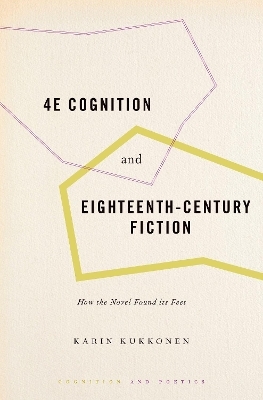
4E Cognition and Eighteenth-Century Fiction
How the Novel Found its Feet
Seiten
2019
Oxford University Press Inc (Verlag)
978-0-19-091304-5 (ISBN)
Oxford University Press Inc (Verlag)
978-0-19-091304-5 (ISBN)
When the novel broke into cultural prominence in the eighteenth century, it became notorious for the gripping, immersive style of its narratives. In this book, Karin Kukkonen explores this phenomenon through the embodied style in Eliza Haywood's flamboyant amatory fiction, Charlotte Lennox's work as a cultural broker between Britain and France, Sarah Fielding's experimental novels, and Frances Burney's practice of life-writing and fiction-writing. Four female authors who are often written out of the history of the genre are here foregrounded in a critical account that emphasizes the importance of engaging readers' minds and bodies, and which invites us to revisit our understanding of the rise of the modern novel.
Kukkonen's innovative theoretical approach is based on the approach of 4E cognition, which views thinking as profoundly embodied and embedded in social and material contexts, extending into technologies and material devices (such as a pen), and enactive in the inherent links between perceiving the world and moving around in it. 4E Cognition and Eighteenth-Century Fiction investigates the eighteenth-century novel through each of these trajectories and shows how language explores its embodied dimension by increasing the descriptions of inner perception, or the bodily gestures around spoken dialogue. The embodied dimension is then related to the media ecologies of letter-writing, book learning, and theatricality. As the novel feeds off and into these social and material contexts, it comes into its own as a lifeworld technology that might not answer to standards of nineteenth-century realism but that feels 'real' because it is integrated into the lifeworld and embodied experiences.
4E cognition answers one of the central challenges to cognitive literary studies: how to integrate historical and cultural contexts into cognitive approaches.
Kukkonen's innovative theoretical approach is based on the approach of 4E cognition, which views thinking as profoundly embodied and embedded in social and material contexts, extending into technologies and material devices (such as a pen), and enactive in the inherent links between perceiving the world and moving around in it. 4E Cognition and Eighteenth-Century Fiction investigates the eighteenth-century novel through each of these trajectories and shows how language explores its embodied dimension by increasing the descriptions of inner perception, or the bodily gestures around spoken dialogue. The embodied dimension is then related to the media ecologies of letter-writing, book learning, and theatricality. As the novel feeds off and into these social and material contexts, it comes into its own as a lifeworld technology that might not answer to standards of nineteenth-century realism but that feels 'real' because it is integrated into the lifeworld and embodied experiences.
4E cognition answers one of the central challenges to cognitive literary studies: how to integrate historical and cultural contexts into cognitive approaches.
Karin Kukkonen is Professor in Comparative Literature at the University of Oslo. She heads the interdisciplinary research priority "Literature, Cognition and Emotions" at the University of Oslo and serves on the steering committee Cognitive Futures in the Arts and Humanities.
Acknowledgements
Introduction: How the Novel Found its Feet
Chapter 1: The Curse of Realism
Chapter 2: Haywood: Shaping a Fictional Language of Embodiment
Chapter 3: Lennox: Repertoires of Embodiment
Chapter 4: Fielding: A Lifeworld of Books
Chapter 5: Burney: Writing Life and Fiction
Chapter 6: The Novel as a Lifeworld Technology
Conclusion
Endnotes
| Erscheinungsdatum | 15.02.2019 |
|---|---|
| Reihe/Serie | Cognition and Poetics |
| Zusatzinfo | 3 halftones |
| Verlagsort | New York |
| Sprache | englisch |
| Maße | 236 x 163 mm |
| Gewicht | 553 g |
| Themenwelt | Geschichte ► Hilfswissenschaften ► Paläografie |
| Geisteswissenschaften ► Psychologie ► Allgemeine Psychologie | |
| Geisteswissenschaften ► Psychologie ► Verhaltenstherapie | |
| Geisteswissenschaften ► Sprach- / Literaturwissenschaft ► Anglistik / Amerikanistik | |
| Geisteswissenschaften ► Sprach- / Literaturwissenschaft ► Literaturwissenschaft | |
| Geisteswissenschaften ► Sprach- / Literaturwissenschaft ► Sprachwissenschaft | |
| ISBN-10 | 0-19-091304-5 / 0190913045 |
| ISBN-13 | 978-0-19-091304-5 / 9780190913045 |
| Zustand | Neuware |
| Informationen gemäß Produktsicherheitsverordnung (GPSR) | |
| Haben Sie eine Frage zum Produkt? |
Mehr entdecken
aus dem Bereich
aus dem Bereich
Schnelle Hilfe bei häufigen Fehlern
Buch | Softcover (2021)
UTB (Verlag)
CHF 25,20
Buch | Hardcover (2023)
Reichert, L (Verlag)
CHF 307,95


